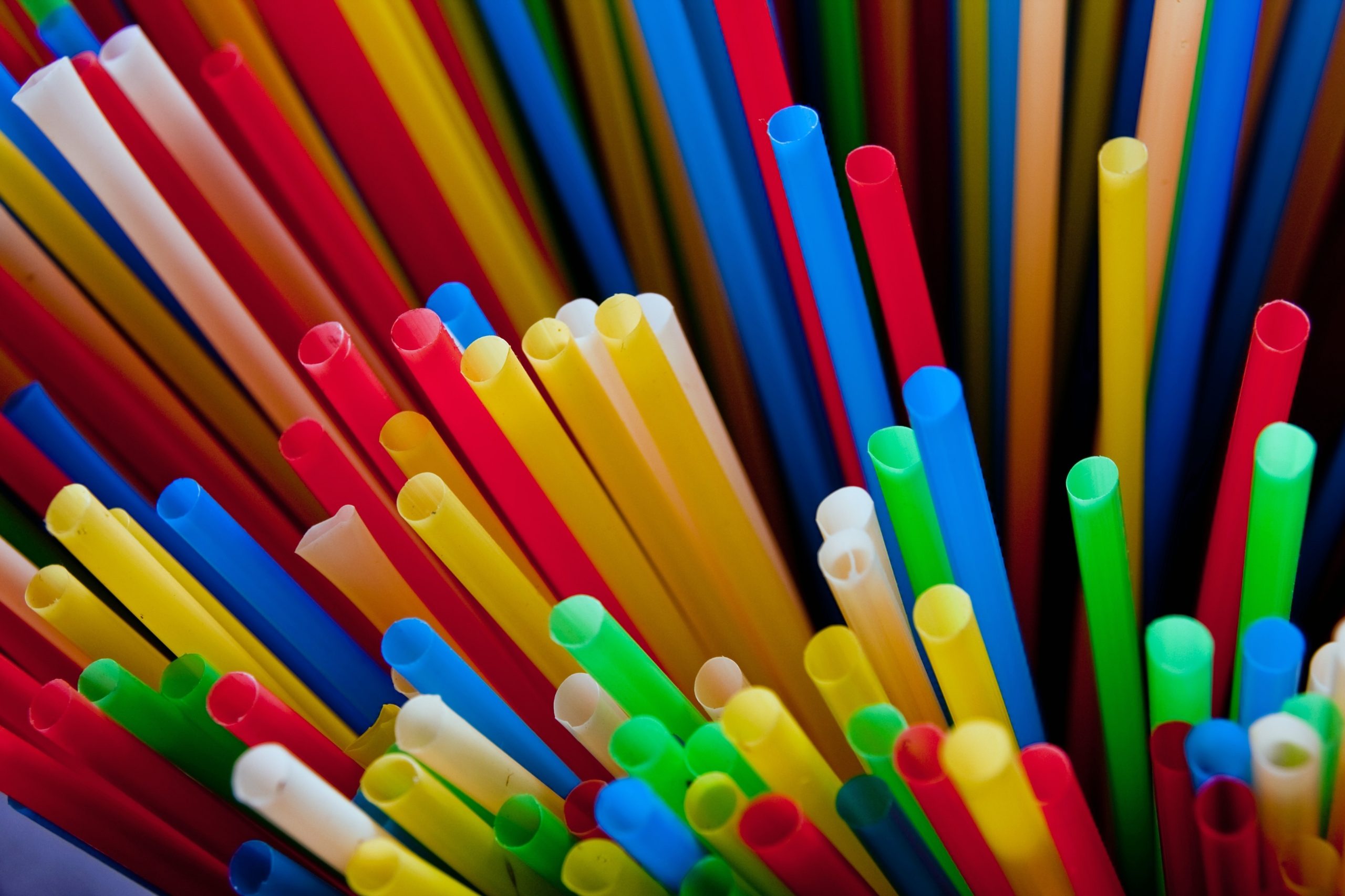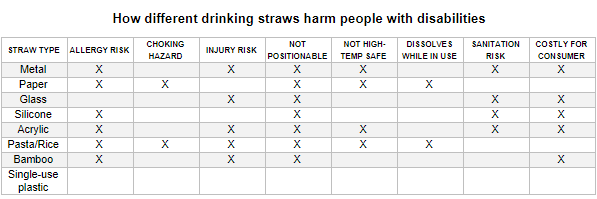
The sound of choking echoing down the hallway is becoming worryingly familiar in my household of late. There is a certain fear inducing factor to awaking at ungodly hours to the noise of a person you love, struggling for air. Adding to this fear is the knowledge that thousands of disabled individuals are now at increased risk of choking and aspiration thanks to bans on a critical disability aid.
Recently diagnosed with a debilitating, terminal illness, my mum has been finding it difficult to stay hydrated, but as her condition worsens, solutions to her thirst become more complicated than before. She does her best to consume as much fluid as possible, but difficulties with swallowing lead to a higher risk of choking and aspiration. For folks with issues with swallowing, chewing, or motor control, as well as people who cannot lift a glass to their mouth, sometimes the only way to get a drink is to use a single-use plastic straw. Although this article isn’t about specifically about my Mum or her situation, it is what got me thinking more about the challenges that disabled people face in accessing something as crucial as water.
I am an environmental scientist, currently completely a PhD in sustainable water management. Over the last few years, I’ve seen a growing number of news headlines heralding the good news of bans against various single-use plastics. For the most part, I respond to these articles by fist pumping the air in excitement. As someone who researches sustainability, it’s something I’ve also seen widely discussed by colleagues and celebrated by environmentally-conscious friends. There is a great need to reduce plastic pollution and cut back unsustainable consumption of resources. I certainly won’t dispute that, yet I find it both interesting and concerning that plastic straws are often one of the first items that these bans choose to axe.
For many of us, single-use straws are a thing of convenience, and it can be hard to fathom just how important they can be others for something as vital as safe access to water. This is especially the case when many of our disabled members of society are not visible or present in spaces due to inaccessibility, ableism, capacity, or institutionalisation. Only a relatively small amount of people need single-use plastic straws, and even then, they may not have to use them all the time. The symptoms of disabilities are often variable. They can worsen at times and be relatively non-existent at others. Every individual and every disability are different. The point here is, unless you are engaging directly with the small portion of the disability community who require straws, you probably haven’t seen or heard someone express just how much they rely on these tools to drink. However, that does not mean those needs do not exist, that they’re not essential, or that a minority of people do not deserve safe access to an essential resource.
My connection with both the disability community and sustainability advocates puts me in a strange position. Many of the disabled people I engage with are open to doing what they can to live more sustainably. One of my best mates, Finn, sometimes relies on drinking straws. Whenever I visit Finn’s house, there are always a range of options available. The top drawer in his kitchen features a colourful variety of reusable drinking straws, from shiny stainless steel to pastel silicone. It’s only in the bottom drawer that you’ll find a packet of single-use plastic straws. Like many disabled people, Finn cares about the environment and is concerned about the issues of climate change and pollution. The perception that disabled people aren’t trying hard enough to reduce waste or aren’t being truthful about our own needs is an offensive assumption. Straw bans put a serious burden on disabled people, and we need allies talking about this more.
In my attempts to communicate the need for single-use plastic straws with people who are passionate about sustainability, a major challenge I’ve faced is helping people understand that there really is no current alternative that meets the needs of all disabled people. The fact is though, that reusable straws can be life threatening for some.
It can be hard for people who do not experience disabilities that impact their capacity to drink, to conceptualise how different needs can coincide, making single-use plastic straws the only possible option. However, members of the disability community who are all too familiar with this struggle, are telling you – It happens. It’s also important to remember these are not just minor inconveniences. They are very real threats to health and safety that disabled people are forced to face when their voices are not appropriately included.
There’s a fantastic chart which I’ve included below that helps to visualise the common issues people can face with different types of drinking straws. Generally speaking, the dangers of some straws include things such as allergy risk, or that they can dissolve into the liquid. Which for some people who require a much longer than average time to finish a drink, this becomes more than just an annoyance. When people can’t hand wash their reusable straws due to disability, this no longer makes them reusable, and people with heightened sensitivities to bacteria or mould may not be able to stand that risk. The blessed creation of the dishwasher has helped to empower disabled people and increase autonomy. Despite its incredible capacities however, it often fails at effectively washing the insides of reusable straws, and not everyone can afford one anyway. This is likely even more so for those in the disability community who are disproportionately lower income.
Even more concerning though, is the injury risk of rigid straws such as those made of metal, glass, acrylic, or bamboo, which are particularly dangerous to some people with balance or mobility disorders. Falling onto one of these straws can cause serious injury, or at worst a potentially fatal accident.
If we are being honest, a key reason that single-use plastic straws have been so heavily targeted is that for most people they only exist as a novelty or minor convenience. They initially came into use to assist hospital patients who were reclining in bed or had medical problems that made drinking difficult. Their introduction to hospitals around the late 1940s significantly reduced incidents of choking and helped to prevent deaths of disabled people.
In her memoir ‘Year of the Tiger’, disability activist Alice Wong refers to single-use plastic straws as a “gateway plastic” used by environmentalists to engage the public in a larger conversation about waste. They are a conversation starter to a bigger issue. That is not to say that these straws don’t cause serious environmental harm when used on a mass scale, but the huge fight to have them completely banned from restaurants, cafes, and anywhere a disabled person would actually require access to water and other delicious drinks, is ableism in action, i.e. discrimination in favour of able-bodied people.
It is not like abled bodied folks’ access to water is free from being environmentally harmful either. The destruction of habitat and extreme alteration of catchment hydrology through urbanisation, dam construction, provision of pipes and other water-supply infrastructure, and associated energy consumption, although playing important roles in providing a growing population with drinking water – Comes with huge environmental costs. Of course, these are not reasons to stop providing the tools and infrastructure that offers us safe drinking water. It begs to question though, why are a small group of people who rely on a specific tool to safely access water, really being thrown under the bus here?
It feels good to pat ourselves on the back when we do something to reduce waste and lessen human impact on the Earth, and it is both important and urgent that we take actions of environmental advocacy. The issue I have is when these actions become merely tokenistic. When they are an easy change for most people but do not appropriately consider the key groups that will be impacted, to a dangerous extent. Ultimately, banning single-use plastic straws looks great at a surface level. It is a ticked green box, all whilst a marginalised community faces further discrimination, and more meaningful yet challenging actions towards sustainability remain overlooked.
Views: 139

